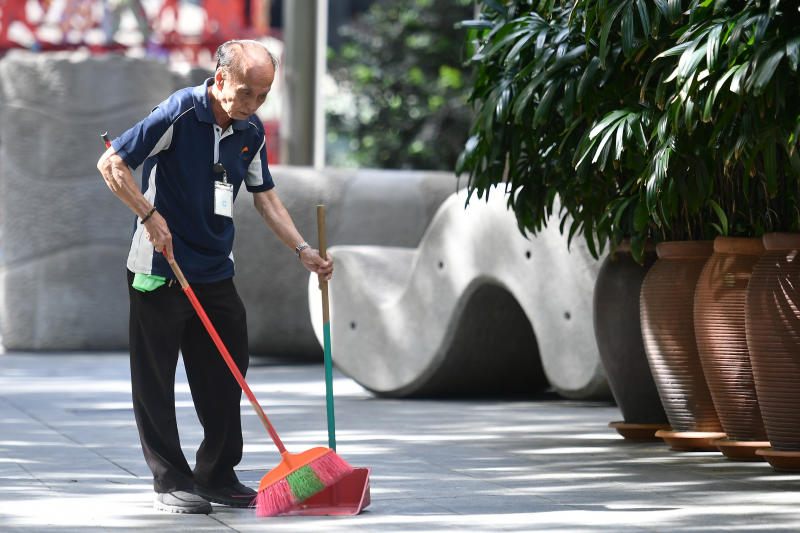Cleaners to be better trained in safety; higher minimum pay for restroom staff
Sign up now: Get ST's newsletters delivered to your inbox

The updates to the progressive wage model for cleaners are among new recommendations made by the Tripartite Cluster of Cleaners.
PHOTO: ST FILE
Follow topic:
SINGAPORE - All resident cleaners will need to be trained in workplace safety and health from 2022 to reduce the risk of slips, trips and falls among a workforce that tends to be older.
Their employers should also send them for one of the core Workforce Skills Qualification (WSQ) modules identified by the Tripartite Cluster for Cleaners (TCC) for their relevant job level.
And the minimum pay for cleaners who look after restrooms must be higher than that of general indoor cleaners from July 1, 2021.
They must receive basic monthly wages of at least $1,486, up from $1,274 for general indoor cleaners, in recognition of the hardships they experience, said the TCC on Tuesday (Dec 3).
These updates to the progressive wage model for cleaners are among new recommendations made by the group, which comprises representatives from the labour movement, employers, service buyers and government. It consulted with tripartite partners, including training providers, for around a year.
The recommendations were accepted by the Government on Tuesday.
"These enhancements will ensure that the cleaning workforce continues to stay relevant, and is well equipped and ready for business transformation," said the National Environment Agency, SkillsFuture Singapore, Workforce Singapore and the Manpower Ministry in a joint statement.
The progressive wage model, which is a ladder that sets out minimum pay and training requirements for workers at different skill levels, has been a compulsory condition for cleaning companies to be licensed since 2014.
Under updates to the model - in 2016 and 2018 - cleaners will get 3 per cent annual wage increases from July 1 next year to 2022, as well as an annual bonus from Jan 1 next year.
TCC chairman Zainal Sapari, an assistant secretary-general at the National Trades Union Congress (NTUC), said discussions are already ongoing on further updates to the wage schedule: "Since we are increasing the base pay levels, we need a strong justification to service buyers to pay more by showing workers are being upskilled."
There are about 39,000 residents who comprise about 68 per cent of the total cleaning workforce. Their average age is 60.
Cleaners must already take at least one WSQ module, but the TCC felt that safety and health should be a priority because the age profile of cleaners tends to be older.
TCC member Tony Chooi, who is president of the Environmental Management Association of Singapore, noted: "Some may not know which chemicals are dangerous. And as more machines are introduced to the industry, it will be good for them to recognise how to use the machines safely."
The TCC curated the list of available courses and is working with training providers to develop more of these to cover all the technical competencies listed under the skills framework for the environmental services industry, which was rolled out in 2017.
The cluster also said "restroom cleaners" should be made a separate job role under the progressive wage model for cleaners. Their salaries will be similar to those of healthcare cleaners in hospitals or general cleaners in town councils, for example.
If they also clean general areas, they should be classified as restroom cleaners if they spend at least half their time cleaning restrooms.
Mr Chooi said about 20 per cent to 25 per cent of cleaners here are restroom cleaners.
The TCC also called on service buyers - such as developers who outsource cleaning of their properties - to adopt contracts based on outcomes rather than worker headcount, and to allow cleaning companies to send workers for training during working hours and without insisting on replacement staff as long as service standards are maintained.
City Developments Limited group general manager Chia Ngiang Hong, who is also on the TCC, said that as a service buyer, "we want efficient and safety-conscious workers because we don't want any accidents".
"If the service provider can assure us that workers are trained we are prepared to consider paying a bit more," he added.
NTUC secretary-general Ng Chee Meng witnessed the signing of an agreement between cleaning company Sun City Maintanence and the Building Construction and Timber Industries Employees' Union to form a company training committee to drive initiatives for the firm's 500 staff.
The firm also committed a $1,000 annual worker welfare fund for the union to utilise for Sun City staff.
"Using our head and coming from both the employer and worker side to put our heads together to design better ways to do things, we make a better living. And importantly I'm very happy that many of our employers also have a big heart for our workers," said Mr Ng.
Sun City toilet and office cleaner Lily Goh, 75, who works at the Apex @ Henderson building where Sun City's main office is, said she has attended many courses on topics such as workplace safety and health and using cleaning robots.
She cleans 21 single-cubicle toilets every day as well as three offices over the course of a week, and earns about $1,500 a month, more than the minimum pay for restroom cleaners come 2021.
Madam Goh said she enjoys her work as it keeps her healthy. "I want to keep attending courses so that I have more experience," she added.

